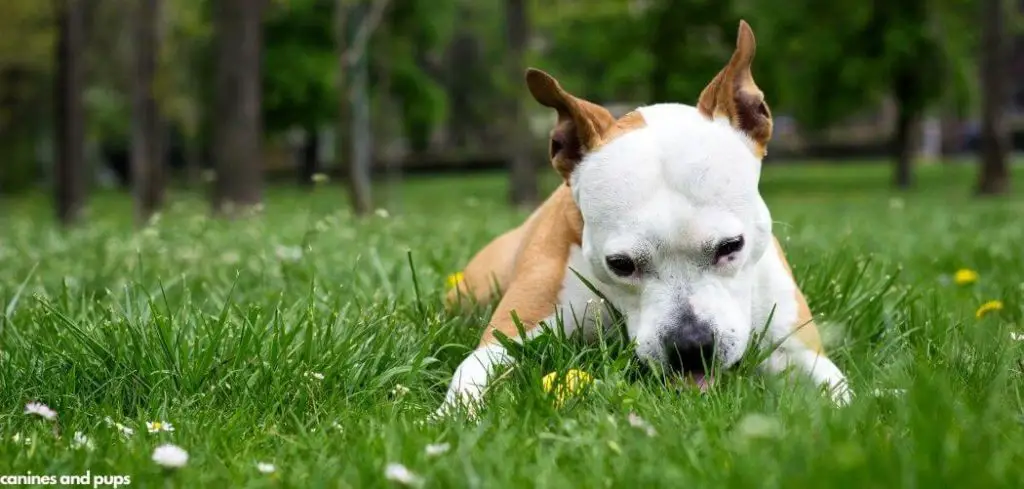When an older dog suddenly starts eating grass in excess and develops diarrhea, it can be alarming. This combination of behaviors often signals an underlying issue that requires attention.
We outline the common reasons why a senior dog may eat grass excessively and develop diarrhea, what you can do, and when to seek veterinary help.
Senior Dog Excessively Eating Grass and Diarrhea — Why It Happens
Senior dogs may excessively eat grass and develop diarrhea for a number of reasons including digestive upset, dietary deficiencies, gastrointestinal diseases, stress, and even more serious age-related illnesses like kidney or liver disease.
Older dogs are also more vulnerable to complications from diarrhea, such as dehydration and weakness, making timely intervention very important.

Senior Dog Excessively Eating Grass and Diarrhea: Common Causes
Gastrointestinal Upset
One of the most common reasons senior dogs eat grass excessively is to soothe an upset stomach.
The rough texture of grass can sometimes induce vomiting, which may temporarily relieve nausea.
Diarrhea may follow due to inflammation or irritation in the digestive tract. In older dogs, even minor gastrointestinal issues can escalate quickly, leading to dehydration or further health complications.
Read more: Old Dog Panting Excessively at Night (Is it harmless or a red flag?)
Dietary Indiscretion
Senior dogs sometimes eat grass when they consume something that doesn’t agree with them.
Spoiled food, table scraps, or sudden changes in diet can irritate the gut. Grass-eating is a way some dogs try to settle their stomach.
This often leads to diarrhea, as the digestive system struggles to process the offending food. For senior dogs, whose digestive efficiency may already be reduced, recovery can take longer.
Inflammatory Bowel Disease (IBD)
Chronic conditions like inflammatory bowel disease become more common as dogs age.
IBD causes ongoing inflammation in the intestines, leading to diarrhea, nausea, and sometimes an increased desire to eat grass.
Excessive grass consumption can be a sign the dog is trying to relieve persistent discomfort. If untreated, IBD can severely impact nutrient absorption and overall quality of life in older dogs.
Parasites
Though less common in seniors than puppies, intestinal parasites can still cause diarrhea and changes in eating habits.
Worm infestations or protozoal infections irritate the gut lining, leading to both grass-eating and loose stools. In older dogs, these infections can take a greater toll, as their immune systems are often weaker.
Liver or Kidney Disease
Age-related organ decline is another possible explanation. Both liver and kidney disease can cause nausea, which may drive a dog to eat grass compulsively.
Diarrhea is a frequent secondary symptom, especially if toxins are building up in the bloodstream due to reduced organ function. In these cases, grass eating is more of a symptom of discomfort than a solution.
Stress and Anxiety
Senior dogs sometimes display unusual eating behaviors due to stress or anxiety. Major life changes, separation, or even cognitive decline can increase anxious behaviors.
Eating grass may serve as a coping mechanism. Diarrhea may follow due to the effects of stress hormones on the digestive tract, making this a dual concern in older pets.
What to Do
If your senior dog suddenly begins eating large amounts of grass and develops diarrhea, monitor closely while offering supportive care.
Make sure they have constant access to fresh water, as diarrhea can quickly lead to dehydration in older pets.
Consider offering a bland diet, such as boiled chicken and rice, to rest the digestive system.
You should also ensure your dog has a calm environment with minimal stress, as anxiety can worsen gastrointestinal symptoms.
Avoid giving table scraps or introducing new foods, as this may irritate their system further. While mild cases sometimes improve with rest and hydration, persistence or worsening signs should not be ignored.
When to Call or Visit Your Vet
Senior dogs are at greater risk of complications from diarrhea, so it’s important to know when to seek veterinary care.
If your dog’s diarrhea lasts longer than 24–48 hours, veterinary attention is necessary. Similarly, if the grass-eating is obsessive, or if your dog seems weak, lethargic, or refuses food and water, contact a vet immediately.
Blood in the stool, vomiting alongside diarrhea, or signs of abdominal pain are urgent warning signs.
A senior dog with pre-existing conditions like kidney or liver disease should always be checked promptly if new digestive issues arise. Early treatment can prevent serious complications and improve recovery outcomes.
Read more: Dog Eating Grass Excessively (Here’s Why)
Key Takeaway
When a senior dog is excessively eating grass and experiencing diarrhea, it often points to an underlying issue ranging from mild stomach upset to serious chronic illness.
While some cases may resolve on their own with rest and supportive care, older dogs should always be monitored closely.
If symptoms persist or worsen, contacting a veterinarian is the safest course of action. With timely care, many senior dogs can recover and maintain a good quality of life.
